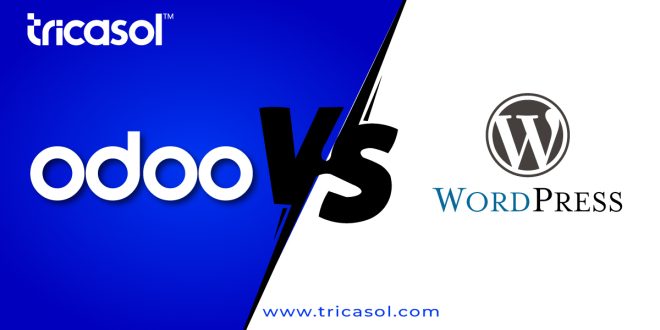Selecting the right platform for your website or business application can significantly impact growth, efficiency, and user experience. Odoo and WordPress are two popular platforms, each offering unique advantages. However, they cater to different business needs, and understanding their strengths and limitations can help you choose the right one for your project.
Overview of Odoo and WordPress
Odoo Development
Odoo is an all-in-one open-source business management software that integrates various modules, including CRM, eCommerce, inventory management, accounting, and more. It is often the choice for businesses looking for comprehensive Enterprise Resource Planning (ERP) solutions that bring multiple operations into one centralized platform.
WordPress Development
WordPress is a widely-used content management system (CMS) known for its flexibility, ease of use, and vast plugin ecosystem. While it was originally designed for blogging, WordPress now powers over 43% of websites worldwide, offering solutions for eCommerce, portfolios, blogs, and small business websites.
Key Differences Between Odoo and WordPress Development
1. Purpose and Use Cases
- Odoo: Best suited for businesses requiring ERP solutions or complex business operations. It helps companies streamline their processes by integrating modules like finance, sales, and human resources under one system.
- WordPress: Primarily focused on content-rich websites like blogs, portfolios, and small eCommerce stores. It’s ideal for businesses looking to establish an online presence quickly without requiring heavy backend operations.
2. Customization and Flexibility
- Odoo: Offers deep customization, but development can be complex and often requires experienced developers. The ability to tailor workflows and modules is a significant advantage for large enterprises.
- WordPress: Highly flexible, with thousands of themes and plugins available. Even non-technical users can set up and manage websites with ease. However, for highly customized solutions, professional development is recommended.
3. E-Commerce Capabilities
- Odoo: Comes with a built-in eCommerce module, making it suitable for businesses looking to integrate online sales with inventory, finance, and CRM in one place.
- WordPress: WordPress requires WooCommerce (a plugin) for eCommerce functionality. WooCommerce is ideal for small to medium-sized stores but might lack the advanced features needed for large-scale operations without additional plugins.
4. Development Cost and Time
- Odoo: Since Odoo offers extensive features, the development process is more time-consuming and expensive. Additionally, businesses may need to hire Odoo specialists for customizations.
- WordPress: Best WordPress development service is generally faster and more cost-effective. Many themes and plugins are either free or low-cost, making it a budget-friendly option for small businesses.
5. User Interface and Ease of Use
- Odoo: Although powerful, Odoo’s interface can have a learning curve, especially for non-technical users. Training is often required to fully utilize its features.
- WordPress: Known for its user-friendly interface, WordPress allows users to create and manage content easily. The intuitive dashboard makes it accessible for users with little technical knowledge.
6. Scalability and Performance
- Odoo: Highly scalable, Odoo can grow with your business as you add more modules and users. It is well-suited for companies expecting rapid growth or those with complex needs.
- WordPress: While WordPress can handle a large number of users, scaling it for heavy-duty applications requires multiple plugins and best hosting solutions, which can impact performance.
7. Security and Maintenance
- Odoo: Since Odoo handles multiple business operations, security is a top priority. It offers built-in security features, but maintaining them requires expert oversight.
- WordPress: WordPress offers many security plugins, but it is more prone to attacks due to its popularity. Regular updates and security patches are essential to keep the site secure.
Which Platform Should You Choose?
Choose Odoo If:
- You need an all-in-one ERP solution for business operations.
- Your business requires complex workflows, CRM, or inventory management integration.
- You expect rapid growth and need a highly scalable platform.
- You have the budget to hire experienced developers for customizations and maintenance.
Choose WordPress If:
- Your focus is on content creation, blogging, or a simple business website.
- You need a budget-friendly solution with quick deployment.
- You want to run a small to medium-sized online store with WooCommerce.
- Ease of use and minimal technical involvement are top priorities.
Conclusion
Both Odoo and WordPress are powerful platforms, but they cater to different business needs. Odoo excels at handling complex business processes with its integrated modules, making it the right choice for larger enterprises or businesses requiring ERP solutions. On the other hand, WordPress shines in content management and eCommerce for small to medium-sized businesses, thanks to its ease of use and cost-effective development.
Ultimately, your choice between Odoo and WordPress should be based on your business goals, budget, and the level of functionality required. Carefully assessing your current needs and future growth plans will help you decide which platform aligns best with your vision.
 Diverse Perspectives: Insights & Stories Exploring Ideas, Sharing Knowledge
Diverse Perspectives: Insights & Stories Exploring Ideas, Sharing Knowledge





